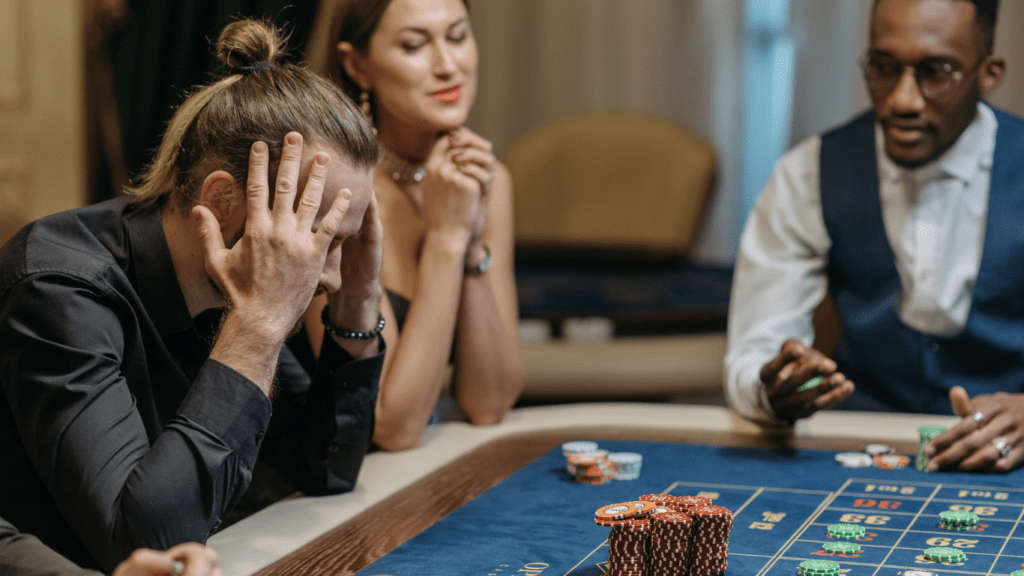Understanding Greed in Gambling
Greed often leads to the downfall of many gamblers. It clouds judgment and fuels irrational decisions.
Definition of Greed in the Context of Gambling
Greed in gambling refers to an overwhelming desire to win more, regardless of existing success. This insatiable drive often causes individuals to exceed set limits, hoping for bigger winnings. Greed shifts focus from enjoyment to a relentless pursuit of more, ignoring potential consequences.
The Psychological Impact of Greed
Greed’s psychological impact on gamblers is profound. It heightens stress and anxiety, as the fixation on winning intensifies the emotional stakes of the game. Decisions made under greed’s influence often lack rationality, increasing impulsiveness when the desire to recover losses or hit jackpots becomes irresistible. This compulsion leads to the neglect of strategic planning, fostering a cycle of poor decisions that compromise financial and mental well-being.
The Role of Greed in Gambling Behavior
Greed drives many decisions gamblers make, affecting their choices and overall behavior at casinos and online platforms.
How Greed Influences Decision Making
Greed clouds rational thinking, prompting gamblers to ignore odds in pursuit of unlikely wins. When motivated by greed, decision making shifts from skill-based strategies to chance-driven bets. The neglect of sound strategy and logic in favor of immediate gratification leads to poor outcomes, ultimately jeopardizing long-term success.
The Cycle of Greed and Loss
Gamblers driven by greed often fall into a destructive pattern of chasing losses. This vicious cycle starts with an initial loss, followed by increased betting to recoup money, which leads to further losses. As greed fuels decisions, individuals risk more, reinforcing their losses and deepening financial woes. Breaking this cycle demands awareness of greed’s role, highlighting the need for responsible gambling practices.
Consequences of Greed for Gamblers

Greed in gambling doesn’t just affect one’s wallet; it impacts mental and emotional well-being too. It’s crucial to understand these consequences to encourage responsible gambling.
Financial Implications
Greed often pushes gamblers to exceed their financial limits. When chasing losses or trying to maximize gains, gamblers might drain savings or amass debt, disrupting their financial security.
Progressive loss accumulation compounds this issue as gamblers frequently overlook existing losses, imagining recouping with larger bets. For instance, someone might lose $500 trying to win back an initial $50 loss, worsening their financial situation drastically. This cycle can result in severe financial distress, leading to potential issues like defaulting on loans or even bankruptcy.
Emotional and Mental Health Costs
- The emotional toll of greed in gambling is significant.
- As losses mount, stress levels soar, creating a tense mental state.
- Gamblers might experience anxiety as the fear of losing out on potential winnings or recovering past losses dominates thoughts.
- Emotional stakes often lead to a feeling of inadequacy or guilt when reflecting on gambling decisions, further affecting mental health.
- Over time, this stress can lead to depression or anxiety disorders. For example, someone heavily focused on winning might ignore signs of unhealthy behavior, such as gambling away money needed for bills, which amplifies negative emotions and creates a destructive loop impacting everyday life.
Strategies to Combat Greed in Gambling
Combating greed is crucial for responsible gambling. Implementing specific strategies can help manage gambling habits effectively.
Setting Realistic Goals
Clear goals can serve as a strong defense against greed. Instead of chasing immeasurable success, I focus on setting achievable targets. For example, if I aim to double my initial investment, I decide on an acceptable loss percentage. By defining these limits, I maintain control over my gambling activities.
Monitoring progress ensures that when I reach my target or hit my loss threshold, I exit the game promptly. Sticking to these pre-determined thresholds prevents escalations driven by desperation for more.
Maintaining Self-Control
- Consistent self-control is vital in avoiding greed-fueled decisions.
- I establish strict rules regarding time spent gambling and the amount of money I’m willing to use.
- I use budgeting tools or apps to keep my expenses in check.
- Utilizing mindfulness techniques, like deep breathing or short breaks, also helps manage stress during intense gaming sessions.
- When temptation strikes, these strategies empower me to pause and reassess, enabling informed decision-making rather than impulsive behavior.
Expert Perspectives on Greed in Gambling
Greed significantly impacts gambling decisions, and experts provide valuable insight into this phenomenon. Both psychologists and professional gamblers offer perspectives on understanding and managing greed.
Insights from Psychologists
Psychologists observe that greed leads to cognitive distortions affecting gamblers’ perceptions. It often results in overconfidence where gamblers misjudge their chances of success.
Dr. Mark Griffiths, a notable researcher in gambling behavior, highlights how greed fuels an illusion of control, causing individuals to believe they can influence random outcomes. This distortion often exacerbates the tendency to chase losses and ignore risks, adding to the cycle of poor decisions. Understanding these cognitive biases helps in developing strategies to counteract greed’s pull.
Professional Gamblers’ Experiences
Professional gamblers recognize greed as a critical factor disrupting disciplined play. Experienced bettor John Patrick shares how early in his career, the lure of larger winnings caused deviations from strategy, leading to greater losses.
Many professionals stress the importance of adhering to predefined strategies to mitigate greed’s effects. Annie Duke, a celebrated poker player, advises staying focused on long-term goals and not being swayed by short-term gains.
These insights illustrate that even seasoned gamblers are not immune to greed but emphasize that recognizing its influence can maintain control and preserve success.

 Tayla Christmas brought her creativity and analytical skills to Wild Gamble Greed, helping design the platform’s interactive features and user-friendly interface. Her attention to detail and commitment to delivering a seamless experience for high-rollers ensured the platform became a trusted resource for gamblers seeking strategic and responsible guidance. Tayla’s efforts have been instrumental in building the foundation for Wild Gamble Greed’s success.
Tayla Christmas brought her creativity and analytical skills to Wild Gamble Greed, helping design the platform’s interactive features and user-friendly interface. Her attention to detail and commitment to delivering a seamless experience for high-rollers ensured the platform became a trusted resource for gamblers seeking strategic and responsible guidance. Tayla’s efforts have been instrumental in building the foundation for Wild Gamble Greed’s success.